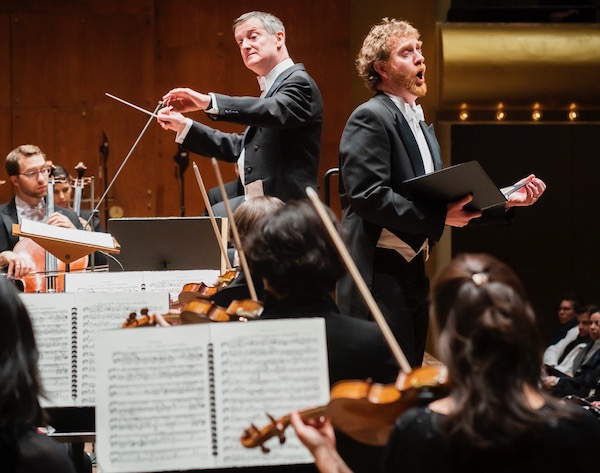Bicket’s freewheeling “Messiah” pays belated dividends with Philharmonic

The same, only different. That’s the rule for holiday traditions in New York, be it the store windows on Fifth Avenue or Messiah at the New York Philharmonic. The comfort of the familiar, the shock of the new. In this town, you have to have both.
The Philharmonic, conducted by Harry Bicket with Boston’s Handel and Haydn Society Chorus and four able soloists, met that challenge one more time Tuesday night, in a way that took some getting used to. Make that a lot of getting used to.
Over two and a half centuries of performances, Messiah seems to have offered two interpretive choices: go “symphonic” with large orchestra and chorus, operatic arias, great choral fugues crashing down like Niagara, the conductor summoning it all with sweeping gestures…or (the more fashionable option recently) pare it down to a handful of performers, with the conductor as a kind of fanatical metronome keeping everybody on the rhythmic straight and narrow, and generating plenty of expression and excitement that way.
But what was one to make of a Baroque-size ensemble occupying not many square feet of the David Geffen Hall stage on Tuesday, whose attitude toward playing together and in time seemed casual at best?
If one wasn’t aware before how many movements of Messiah are in the swaying 6/8 “siciliano” rhythm (tum ta-da, tum ta-da), one certainly was after hearing Bicket and his musicians blur it consistently in “But who shall abide,” “I know that my Redeemer liveth,” the Pifa (Pastoral Symphony) and elsewhere.
At the end of Part I, conductor and soloists did not return for bows and concertmaster Sheryl Staples led the orchestra offstage promptly—most likely a planned move, but the audience’s tepid applause demanded no more.
It wasn’t until the beginning of Part II, with Bicket waving arms over the dotted rhythms of the chorus “Behold the Lamb of God,” with predictably imprecise results, that one realized there might be some method to this madness, that the conductor was trying to loosen the reins and let some freedom of expression in.
It didn’t really work most of the time for this listener, especially in the unfriendly acoustics of Geffen Hall, where such ambiguous, contradiction-embracing interpretations go to die. But give it credit for being intentional, not just a mistake.
And there were many beauties to admire along the two-and-a-half-hour way. The slimmed-down Philharmonic did not sound its best without a firm hand on the tiller, but the choral guests from Boston, prepared by their director Harry Christophers, didn’t let the reins slip entirely, projecting Handel’s daunting fast roulades into the hall more crisply than any of the soloists managed to do. Their balance, intonation, and variety of articulations left nothing to be desired all evening.
The soloists—all, like the chorus, making their Philharmonic debut—had vocal power to spare for the large hall. Tenor Joshua Ellicott was, in fact, a little too much “in love with the hairpins,” as musicians say, the big vocal swells to forte coming at the expense of the sense of the text in the work’s opening air, “Comfort ye.” But later he modulated his oboe-like voice to duet nicely with countertenor Anthony Roth Costanzo in “O death, where is thy sting?”
Possessed of a massive bass-baritone voice, Dashon Burton could have raged more in “Thus saith the Lord” and “Why do the nations,” but he made the text speak eloquently in “The people that walked in darkness,” and he put shade on the actual trumpet obbligato of “The trumpet shall sound” with his spectacular delivery.
Soprano Louise Alder’s ivory-toned soprano was consistent from top to bottom, and her supple phrasing and artful management of vibrato were exemplary. Again, the emphasis in her performance seemed to be on beauty in singing rather than the meaning of the texts.
Costanzo, substituting for his fellow countertenor Iestyn Davies (who was suffering from flu or a cold), seemed to find his extensive solo part uncomfortably low most of the time. It was a relief to hear him fly high and improvise at cadences. He did, however, have the night’s show-stopping moment in the long da capo air “He was despised,” availing himself of the night’s anything-goes ethos to slow the tempo down and hold the audience spellbound with the vocal basics of line, phrasing, diction, and eloquent pauses.
In the three choruses following Costanzo’s air, Bicket varied his approach: crisp and sharp in the dotted rhythm of “Surely, He hath borne our griefs,” a surprisingly swimmy legato treatment of “And with his stripes we are healed,” and a fleet-footed “All we like sheep.” He tried to put “Hallelujah” in context with a fast, light treatment. (The audience stood up anyway, because that’s what you do.)
The final “Amen” began in an even more surprising pianissimo legato, the strings lagging a bit behind the chorus for dreamy page after page. At last the movement swelled to a rhapsodic fortissimo, closing the oratorio in a blaze of trumpets and thwacking timpani, to the audience’s delight. And so this risk-taking conductor’s last risk paid off handsomely.
Messiah will be repeated 7:30 p.m. Wednesday, Thursday and Saturday, and 2 p.m. Friday. A Philharmonic spokesperson said that Anthony Roth Costanzo will sing on Wednesday, but that Iestyn Davies “hopes to return for the remaining performances.” nyphil.org; 212-875-5656.






